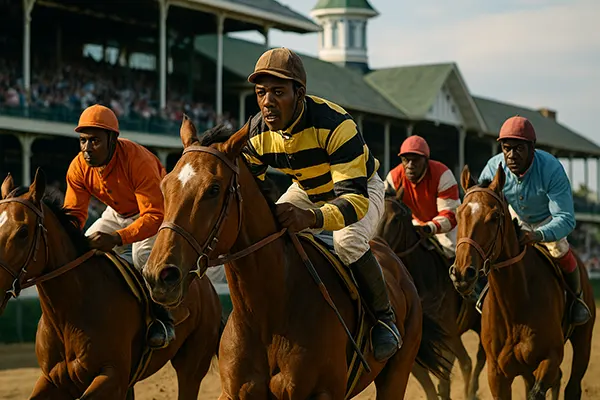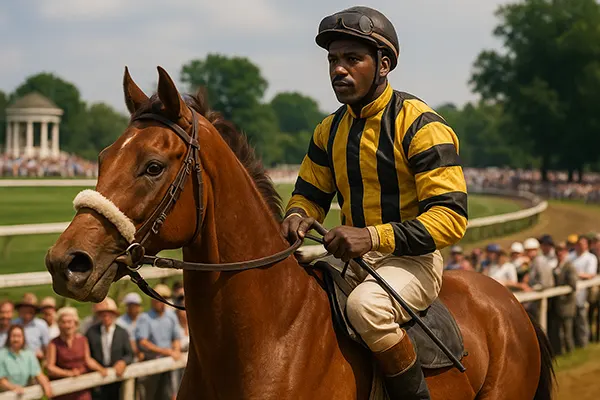The Forgotten Legacy of African American Jockeys in Kentucky

The story of horse racing in Kentucky is often told with names like Churchill Downs and the Kentucky Derby, but behind the glamour lies a deeply rooted history that has been largely erased from public consciousness. In the 19th century, African American jockeys dominated the sport and left an indelible mark on American racing. Their story is one of talent, struggle, erasure, and resurgence—a vital chapter that deserves recognition and remembrance.
The Rise of Black Jockeys in the 19th Century
In the years following the American Civil War, African American jockeys rose to prominence in the sport of horse racing, particularly in Kentucky. Many of them were formerly enslaved individuals or the descendants of slaves who had developed deep bonds with horses on plantations. Their natural talent, experience, and familiarity with the animals made them leading figures in racing.
During the inaugural Kentucky Derby in 1875, 13 of the 15 jockeys were African American, including the winner, Oliver Lewis. Riders like Isaac Murphy, who won three Kentucky Derbies and was the first jockey inducted into the Hall of Fame, were national celebrities at the time. Black jockeys held the majority of victories in the early decades of the Derby, dominating the sport well into the 1890s.
This era marked a golden age for Black jockeys in America. Their exceptional skills earned them respect from horse owners and spectators alike. However, this recognition was short-lived due to a confluence of systemic racism and social change.
The Systemic Disappearance from the Sport
As the 20th century approached, the social and political landscape in America shifted dramatically. The rise of Jim Crow laws across the South enforced racial segregation and reinforced white supremacy. This environment gradually pushed Black jockeys out of the sport they once dominated.
White jockeys and racing authorities began to collude, often resorting to intimidation and physical violence. Many African American riders found themselves excluded from prestigious races or deliberately sabotaged on the track. Owners became reluctant to hire them, fearing backlash from white patrons and institutions.
By the 1920s, African American jockeys had all but vanished from top-tier races. The legacy of these early pioneers was quietly buried, with future generations largely unaware of their contributions to the sport’s development in Kentucky and beyond.
Modern Recognition and Historical Justice
Efforts to recover and preserve the history of African American jockeys have gained momentum in recent decades. Scholars, community leaders, and descendants have taken steps to document the overlooked contributions of these athletes. Institutions such as the Kentucky Derby Museum have begun to highlight their stories more prominently in exhibitions and public outreach.
Events like the African American Jockeys Project have helped bring attention to key figures like Isaac Burns Murphy, Jimmy Winkfield, and others whose records speak volumes about their greatness. These efforts not only honour their legacy but also educate the public about an important chapter in sports and civil rights history.
There is also a growing demand for systemic change in how racing history is told and preserved. Advocacy groups push for curricular updates in schools and greater media representation to reflect the truth about early Black jockeys and their achievements.
Voices from the Present: Descendants Speak Out
Many descendants of Black jockeys now speak with pride about their heritage while calling for broader recognition of their ancestors. Oral histories, interviews, and community-led memorial projects offer rich insights into the lives and struggles of these forgotten sportsmen.
For example, descendants of Isaac Murphy have collaborated with historians to restore his grave and establish educational initiatives in his name. Meanwhile, families of other riders work to collect artefacts, race records, and family stories to ensure they are not lost to time.
Such initiatives highlight not just the personal legacies, but also the collective cultural importance of acknowledging African American contributions to Kentucky’s horse racing heritage.

Why This Story Matters Today
The erasure of Black jockeys from Kentucky’s racing narrative is not just a historical oversight—it’s a reflection of broader social injustices that persist today. By understanding and addressing these gaps, we move closer to a fuller, more inclusive picture of American history.
Their story intersects with themes of resilience, racial justice, and cultural pride. In an era when sports history is being reevaluated through the lens of equity, the story of African American jockeys provides a compelling case for restorative memory and representation.
Furthermore, this history speaks to local identity in Kentucky. Embracing this heritage helps communities connect more deeply with their past, instilling a sense of pride and awareness in younger generations.
Preserving Legacy for Future Generations
Educators, journalists, and historians have a responsibility to amplify these stories. Incorporating the lives of Black jockeys into mainstream history books and media projects ensures they are no longer a footnote but a central narrative.
Public commemorations, historical markers, and museum exhibits continue to play a key role. But perhaps most importantly, storytelling—through writing, film, and community engagement—will keep this legacy alive.
By reclaiming the forgotten legacy of African American jockeys, we not only honour their contributions but also set a precedent for how we approach historical justice across all domains.
